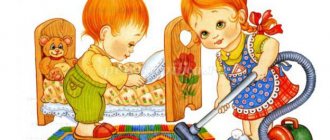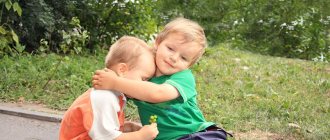Consultation for parents. “Moral education of a preschooler in the family”
03/12/2019, Group No. 11 No comments
Preschool childhood is an important period in the moral development of the individual. Research by scientists in the field of pedagogy and psychology indicates the formation of the basic moral qualities of an individual during these years. The family plays a special role in the moral development of the child. The family has a strong influence on the developing personality. Its impact is long-lasting and constant. By mastering the norms of behavior and attitudes of parents, the child adopts a lot from them, and behaves accordingly with loved ones and outside the family.
Moral education involves the formation in a child of feelings, habits of moral behavior and moral ideas - about good and evil, about the phenomena of social life.
Teachers and parents face the following tasks in developing moral behavior in children:
- formation of a culture of behavior, educating them at home, in kindergarten, and public places, observing generally accepted norms;
- teach respect, treat others, take into account their affairs, interests, comforts;
— to cultivate a culture of communication with adults and peers, expressed in sociability, restraint, delicacy, modesty, sensitivity, and the ability to take into account the interests of the majority;
— cultivate a culture of activity (the ability to handle toys, books, personal belongings, the ability to negotiate with children, etc.);
- develop in the child basic skills for organizing his free time in accordance with the established routine of life in kindergarten and in the family;
— to form reasonable needs in the child and cultivate a sense of duty.
Good manners do not develop on their own, as many parents believe. The very definition of “good manners” suggests that this is the result of his upbringing. Unfortunately, some parents believe that nurturing a culture of behavior and communication skills, politeness, and restraint is the lot of adults, and therefore they say: “Everything will come with age, but for now you’ll ask him. Child". Meanwhile, the preschooler grows up without knowing the most basic and accessible laws of decency.
Raising a small child begins with instilling in him useful habits that organize his behavior and communication with adults and peers.
What are the most important moral qualities we want to see in our children?
Politeness... It decorates a person, makes him attractive, evokes a feeling of sympathy among others - “Nothing is so cheap and is not valued so much as politeness.” It is important that any manifestation of politeness becomes a well-recognized necessity for the child.
Politeness acquires value if it is manifested at the behest of the heart.
Sensitivity... This moral quality of a person is expressed in his attitude towards others. Sensitivity is manifested in caring for people, the ability to come to their aid. In the family, parents should teach their children to show this quality in business (“Help grandma”; “Share with your brother”), develop the ability to sympathize (Mom is tired, don’t make noise, play quietly).
A sense of tact... It is a regulator of a person’s actions. Tact helps to determine when to enter into a conversation and when to remain silent, what is possible and good and what is unacceptable and bad, how to resolve an acute situation so as not to offend a person, how to convincingly defend your position and at the same time not to humiliate or offend the pride of others.
With targeted upbringing, an older preschooler should have an elementary sense of tact. It manifests itself in not insisting on the immediate fulfillment of one’s desire if an adult refuses, in the ability to wait, to give in, not to interrupt the conversation of adults, to take into account the mood and capabilities of loved ones, not to vigorously express one’s curiosity when it concerns a stranger, not to utter out loud your opinion about him, etc. A child must be able to behave ethically towards people around him, without offending their human dignity.
Consideration... It is necessary to ensure that children show consideration, attention, and help to others out of good intentions.
Older preschoolers are already able to understand what it means to be helpful, to be able to offer help without waiting to be asked. It is necessary to prompt the child in cases where he can show caution: pick up a dropped item, hold the door, letting the older or younger one pass ahead.
Modesty... This moral personality trait is an indicator of true upbringing. A modest person does not try to seem original, does not stick out his “I,” and behaves simply, naturally, with dignity. Modesty is accompanied by respect and sensitivity towards people and high demands on oneself.
Modesty must be instilled in a child from an early age. A person who was not taught restraint and modest behavior in childhood later acquires these qualities with difficulty.
It is necessary to develop in children the ability to take into account the opinions of the majority and the convenience of others; to act well not for the sake of praise, but because it cannot be otherwise; teach children not to brag about their successes, a beautiful dress or toy, and not to rush into answers in class. Children who do not have modesty should be praised less often (“Not only you can do it, but others too”), and instill in them the ability to obey generally accepted rules.
It happens that parents make a mistake in assessing the child’s command, they strive for their child to behave naturally, at ease, but at the same time they cannot always determine the boundaries where ease ends and swagger begins. If the concepts of “behaving at ease” and “behaving casually” are identified, then it may happen that instead of the ability to act casually, swagger is reinforced in the child. Parents did not take into account one nuance: ease also implies restraint and modesty.
Sociability... It is based on elements of goodwill, friendliness towards others - indispensable conditions in developing a culture of relationships in children. A child who experiences the joy of communicating with peers will readily give up a toy to a friend just to be close to him; for him, showing kindness is more natural than impudence and harshness. These manifestations are the origins of respect for people. A sociable child quickly finds a place in the children's team.
Discipline... It manifests itself in a person's actions. From childhood, it is necessary to develop qualities in a child: the ability to be active, take initiative, independence, collectivism.
Moral education of preschool children: the role of the family
A preschooler is a child 4-6 years old. During this period, adults can actively influence the child's views and some personality traits.
Many children attend kindergartens, but it is still the parents who have the maximum moral authority for the kids. Therefore, the moral education of preschool children rests almost entirely with the family.
The values that will mean a lot to a child in the future are determined by his environment. In order for children to grow up honest, humane, and responsible, they need a worthy role model before their eyes. The moral education of preschool children is based, first of all, on the personal example of loved ones. If parents make a sincere choice in favor of spiritual values, then the child will be able to follow them in doing the same.
Unfortunately, many mothers and fathers do not have the opportunity to spend much time with their children. A busy work schedule can greatly limit communication with the younger generation. Does this reduce the role of the family in the moral education of preschool children? Of course not.
Try to make the most of the time you spend with your baby. It sounds trite to say that children grow up quickly. But this fact is directly related to moral education. In just a few years, your preschooler will gain other authorities besides his parents, his opinion will depend on the words of many strangers, and family approval will not be decisive. It is necessary to use all opportunities for the moral education of preschool children in order to have time to invest spiritual values in the child.
Moral education of younger preschoolers
Young children have certain characteristics in their perception of our world. The younger the baby, the more imaginative thinking he has. The moral education of younger preschoolers is built taking into account these features.
At the age of 3-4 years, a child mainly learns about the world through play. By introducing elements of moral education into the gameplay, you can achieve colossal success. You can use different characters to demonstrate kindness, compassion, courage, and honesty. Your assessment of the behavior and actions of fictional characters is important to your child.
Games with peers are also important for the moral education of preschool children. Adults need to monitor these activities of children and unobtrusively intervene in the process if necessary.
Special classes in moral education at this age are practically not needed. The personal example of adults and properly organized games contribute to familiarization with the basics of the moral laws of society.
Moral education of older preschoolers
Older children already have a large amount of knowledge about human society and its laws. A 5-6 year old preschooler not only perfectly understands the difference between good and evil deeds, but also has enough self-control to limit himself.
The moral education of older preschoolers is a difficult task, as it requires maximum sincerity and passion from an adult.
However, in some ways it becomes easier with older children. For example, humane books, cartoons, and plays come to the aid of adults. Good works of art affect children at the emotional and intellectual level. Moral education of preschool children through art is a traditional method. Parents need to choose the right works and discuss the impressions received with their child. The role of conversation at this age gradually becomes greater.
Goals of moral education of preschool children
The goal of moral education of preschool children, as well as any education in general, is to prepare a worthy member of society. Think about how you would like to see your child in the future. The moral aspect of your baby's personality is of great importance. Almost all parents would like to see their child strong, responsible, humane, kind, and honest.
The goal of moral education of preschool children is to familiarize the child with moral laws and basic spiritual values. The child must make the choice in favor of a good start sincerely and independently, but under the strict guidance of adults.
Nowadays, there are parents who protest against the moral education of children. Their main argument is that it will be extremely difficult for a child with a high moral level to survive in our cruel society. In general, this approach is understandable, but it is very controversial.
Firstly, morality is a sincere commitment to the internal ideals of society, which means it helps to live in a team. Secondly, even if an immoral person manages to achieve a lot in life, it will be, first of all, material values. It is almost impossible to create a strong family, make friends, and maintain communication with relatives without observing moral laws. Perhaps, in the complete absence of spiritual principles, such a person will not feel his own loneliness and inferiority. But will parents who raised an immoral child be happy? Most likely no.
Moral education of children is a movement towards a happy future for your child. Based on traditional values, the child will be able to overcome any difficulties in the future.







